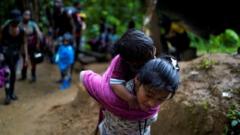This website uses cookies so that we can provide you with the best user experience possible. Cookie information is stored in your browser and performs functions such as recognising you when you return to our website and helping our team to understand which sections of the website you find most interesting and useful.


More than 30,000 children have crossed the Darién Gap, the dense expanse of jungle straddling Panama and Colombia, in the first four months of this year.
According to figures released by the United Nations' children's agency, Unicef, the number of minors embarking on the dangerous journey is up 40% compared to last year.
Most of them are trying to reach the United States.
Migrants making the jungle crossing are often robbed or extorted by criminal gangs and many have been sexually abused.
Doctors Without Borders (MSF) recorded 214 cases of sexual violence in the Darién jungle in the month of December alone.
The international medical organisation said migrants had described how they had been detained by armed men who had forced them to remove their clothes and sexually abused them.
While MSF said that most victims of sexual violence were women, its teams have also provided treatment to men and children.
Unicef deputy executive director Ted Chaiban said that many children had died "on this arduous, dangerous journey".
There are no roads through the Darién Gap and crossing it on foot can take a week.
According to Unicef, 2,000 out of the more than 30,000 children who had embarked on the journey in the first four months of 2024 did so unaccompanied.
"The Darién Gap is no place for children," Mr Chaiban said.
Unicef has helped migrant children, providing them with water, sanitation and hygiene as well as health services, but the organisation says it needs more funds to address their most urgent needs.
The large number of migrants through the Darién Gap has become a political issue in Panama, with President-elect José Raúl Mulino saying during his acceptance speech that he will "close" the route.
"This is not a transit route, no, this is our border," said Mr Mulino, who will be sworn in in July. He did not clarify how he would block the route.



 Africana55 Radio
Africana55 Radio 
